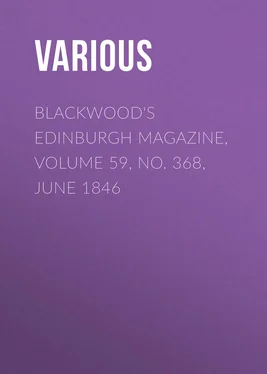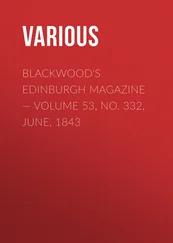Various - Blackwood's Edinburgh Magazine, Volume 59, No. 368, June 1846
Здесь есть возможность читать онлайн «Various - Blackwood's Edinburgh Magazine, Volume 59, No. 368, June 1846» — ознакомительный отрывок электронной книги совершенно бесплатно, а после прочтения отрывка купить полную версию. В некоторых случаях можно слушать аудио, скачать через торрент в формате fb2 и присутствует краткое содержание. Издательство: Иностранный паблик, Жанр: periodic, foreign_edu, Путешествия и география, на английском языке. Описание произведения, (предисловие) а так же отзывы посетителей доступны на портале библиотеки ЛибКат.
- Название:Blackwood's Edinburgh Magazine, Volume 59, No. 368, June 1846
- Автор:
- Издательство:Иностранный паблик
- Жанр:
- Год:неизвестен
- ISBN:нет данных
- Рейтинг книги:5 / 5. Голосов: 1
-
Избранное:Добавить в избранное
- Отзывы:
-
Ваша оценка:
- 100
- 1
- 2
- 3
- 4
- 5
Blackwood's Edinburgh Magazine, Volume 59, No. 368, June 1846: краткое содержание, описание и аннотация
Предлагаем к чтению аннотацию, описание, краткое содержание или предисловие (зависит от того, что написал сам автор книги «Blackwood's Edinburgh Magazine, Volume 59, No. 368, June 1846»). Если вы не нашли необходимую информацию о книге — напишите в комментариях, мы постараемся отыскать её.
Blackwood's Edinburgh Magazine, Volume 59, No. 368, June 1846 — читать онлайн ознакомительный отрывок
Ниже представлен текст книги, разбитый по страницам. Система сохранения места последней прочитанной страницы, позволяет с удобством читать онлайн бесплатно книгу «Blackwood's Edinburgh Magazine, Volume 59, No. 368, June 1846», без необходимости каждый раз заново искать на чём Вы остановились. Поставьте закладку, и сможете в любой момент перейти на страницу, на которой закончили чтение.
Интервал:
Закладка:
Jean le Rond d'Alembert was born in November 1717, and was exposed as a foundling near the church of St Jean le Rond in Paris, and thus called by the name of the parish. The commissary of the district, taking pity upon the infant's apparently dying condition, instead of sending it to the hospital, where it would have inevitably died, gave it to be nursed by the wife of a poor glazier. In a few days, however, a person named D'Estouches, a commissary of artillery, came forward, acknowledged the child, and made provision for its support. The habits of foreign life are generally so scandalous, that they can scarcely be alluded to without offending our sense of delicacy. The mother of this infant was an unmarried woman, living in the very highest circles of Paris, the sister of Cardinal Tencin, archbishop of Lyons. This woman thus added to her vice the cruelty of exposing her unfortunate offspring to die of cold and hunger in the streets. It does not appear that her profligacy, though notorious, ever affected her position in society. Her coteries were as gay, her circle was as complete, and her rank as high, as ever. In the Paris of those days, "throwing the first stone" was unheard of; its reaction would have been an avalanche; there was no scandal where there was no concealment; there was no crime where there was no conscience; and thus danced the world away, until the scourge of a higher power swept the whole noblesse of France into beggary and exile.
D'Alembert seems to have taken his surname from that of his nurse, and was sent, when twelve years old, to the College of La Nation, then in the possession of the Jansenists. There he learned mathematics. On leaving the college, he returned to the glazier's house, there had one room for his bedroom and study, lived on the family fare, supported himself on a pension of £50 a-year left to him by his father, and in that house lived for forty years. He once made an abortive attempt to study the law and medicine, but soon grew weary of both, and returned to mathematics, for which he had a decided predilection. His application to this study, however, by no means pleased the homely sense of his old nurse. "You will never be any thing better than a philosopher," was her usual saying. "And what's a philosopher? – a fool, who wears out his life, to be spoken of after he is dead."
But D'Alembert had evidently a passion for science; and in his twenty-third year he sent to the Academy of Sciences an analytical paper, which attracted general notice. This was followed by his admission into the society, at the unusually early age of twenty-four. From this period, he proceeded for eighteen years, constantly furnishing the Academy with papers, which added greatly to its reputation and his own. In a note on the presumed discovery of Taylor's Theorem by D'Alembert, the noble biographer alludes to what he regards as a similar event, the discovery of the "Binomial Theorem" by himself. We must acknowledge, that we cannot easily comprehend how any student, within the last hundred years, could have had this "discovery" to make – the Binomial Theorem being one of the very first which meets the eye of the algebraist, in Newton's, and every other treatise on analysis. It seems to us very like an English reader's "discovery" of the alphabet, or, at least, of the recondite art of spelling words of two syllables. But D'Alembert was at length to find, that if he was to obtain either fame or fortune, he must seek them in some other road. At this period, infidelity had become the distinction of all who arrogated to themselves intellectual accomplishment. The power of the crown, and the power of the clergy, had hitherto made its expression dangerous; but the new liberalism of the throne having enfeebled its power, the reign of the libeller, the rebel, and the sceptic openly commenced. The opulence of the clergy increased the bitterness of their enemies; and the blow which was intended to lay the throne in the dust, was nominally aimed at religion. Voltaire had commenced this crusade half a century before; but the arch-infidel lived beyond the dominion of France, possessed an independent income, had acquired the reputation of the wittiest man in Europe, and had established a species of impunity by the pungency of his perpetual sneers. During this period, French infidelity had been silent through fear, but it was not the less virulent, active, and general. It appeared in the result, that almost the whole of the French higher orders were either deists or total unbelievers. All the literary men of France followed the example of Voltaire, and a scoff at religion was always accepted as an evidence of wit. France loves extremes; and, as the poplar literature of Paris is now plunged in impurity, fifty years ago it was characterized by outrageous blasphemy. The only religion which France knew, was certainly not calculated to repress the evil. Its fantastic exhibitions and grim formalities, were equally obnoxious to the human understanding. Its persecuting spirit insulted the growing passion of the people for liberty; while its fierce dogmas, contrasting with its ridiculous traditions, supplied the largest materials at once for horror and ridicule.
At length the storm broke forth. The infidelity which had danced and smiled, and made calembourgs and scoffed, in the full-dress circles of the nobles; made its appearance in the streets and highways, in rags and riot, with the axe for the pen, and blood for the ink, and trampled the whole polished race of scoffers in the mire of Revolution.
The Encyclopédie was the great text-book of the literary faction, and Diderot and D'Alembert were the editors of its first seven volumes – D'Alembert writing the preliminary discourse upon the progress of the sciences. But the latter mixed caution with his courage; for on the issue of the government prohibition of the work, he abandoned the editorship and left it to Diderot.
At length, in 1752, the King of Prussia, who, with all his fame, had the weakness of being emulous of French flattery, offered him an appointment at Berlin, with an allowance of five hundred pounds a-year, and the reversionary office of president of the academy. But this royal offer he refused, on the ground of his reluctance to quit Paris, and the fear that the employment would be inconsistent with his freedom. At this period his fixed income seemed to be about seventy pounds a-year; yet, when we suffer ourselves to be astonished at the apparent magnanimity of the refusal, we are to remember that this sum, a hundred years ago, and in Paris, would be about equivalent to two hundred pounds a-year in England at the present day; that, like all Frenchmen, he hated Germany; that Frederic's dealings with Voltaire gave by no means a favourable specimen of his friendships; and that, to a Frenchman of that day, Paris was all the world. But, ten years after, the Empress Catharine made him the much more tempting offer of the tutorship of her son, afterwards the unfortunate Emperor Paul. The salary was to be magnificent, no less than four thousand pounds a-year; still he refused the offer, and preferred remaining in Paris.
Whether we are to applaud his magnanimity, or blame his habits, on this occasion, may fairly be a question. The possession of the four thousand pounds a-year, even if it were limited to the period of tuition, would have made him opulent; and his opulence would undoubtedly have given him the means of extensive benevolence, of relieving private distress, of assisting his less fortunate literary brethren, of promoting public objects, and ultimately, perhaps, of founding some valuable institution which might last for ages. But D'Alembert, and men like him, seem to live only for themselves. It would have cost him an absence from Paris for a certain period to have obtained this power of public good; and he preferred living without it, and haunting, night after night, the coteries of the old blue-stockings who kept open house for the evening gossipry of the capital.
Читать дальшеИнтервал:
Закладка:
Похожие книги на «Blackwood's Edinburgh Magazine, Volume 59, No. 368, June 1846»
Представляем Вашему вниманию похожие книги на «Blackwood's Edinburgh Magazine, Volume 59, No. 368, June 1846» списком для выбора. Мы отобрали схожую по названию и смыслу литературу в надежде предоставить читателям больше вариантов отыскать новые, интересные, ещё непрочитанные произведения.
Обсуждение, отзывы о книге «Blackwood's Edinburgh Magazine, Volume 59, No. 368, June 1846» и просто собственные мнения читателей. Оставьте ваши комментарии, напишите, что Вы думаете о произведении, его смысле или главных героях. Укажите что конкретно понравилось, а что нет, и почему Вы так считаете.












